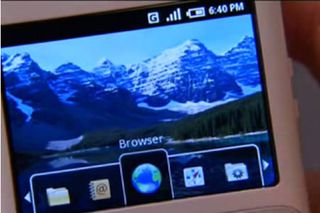Google gets ready for Android launch
Features and developer support revealed ahead of the first handsets hitting the UK market.

The androids are coming, and they will be open source. That is the message from Google as it readies the launch of the first devices running its Android mobile device platform.
The first Android devices are still on course for launch in the fourth quarter of this year, with HTC among the first hardware makers to produce devices using the software.
"Mobile phone growth is huge, with many people, especially in Europe having more than one, adoption rates are continuing to grow and we wanted to be a part of that," said Mike Jennings, an Android developer advocate at Google while speaking at today's Google's London developer event at Wembley Stadium.
Great care was taken to cover up the operator logo on the demonstration handset, though it is widely believed that the first operator to offer an Android phone in the UK will be T-Mobile, following in the footsteps of T-Mobile USA.
For those not familiar with Android, it is an open source mobile device platform based around the 2.6 Linux kernel, and making heavy use of OpenGL and Java for application development and graphical construction.
"Initially there is not going to be any support for creating native applications. At a later date, when we can make it an easy experience, then we may open things up. We are really trying to steer people towards Java development right now. You really don't need to go native for speed," said Jennings.
Security is also at the forefront of the application development process, with all third party applications having to request permission to access phone services such as the dialler and the internet connection, to prevent malicious access or dialling out to premium rate numbers.
Get the ITPro. daily newsletter
Receive our latest news, industry updates, featured resources and more. Sign up today to receive our FREE report on AI cyber crime & security - newly updated for 2024.
Applications developed for Android devices will also be supported by an online store, called the Android Marketplace. The concept is similar to that used by Apple for its iPhone smartphone, but will be more open and there will be no royalty payments to Google for use of the Android platform.
Jennings revealed that there are almost no minimum limitations on hardware makers, suggesting that there will be a wide range of Android-based devices on the market including budget units, rather than just high-end devices packed with expensive features such as GPS and expandable memory.
"With Windows Mobile you are obliged to include some specific base applications on the device, regardless of whether they are used. With Android, you can use only what you want to, so you can strip it down to the basics or include every base feature available," Jennings added.
However, Android's support for specific push email services remains vague, suggesting it will be left up to third party developers to produce applications that can talk to Exchange servers and BlackBerry extensions, rather than having it integrated into the device as with the iPhone and Windows Mobile devices.




